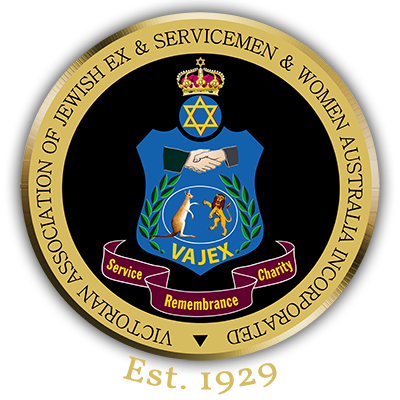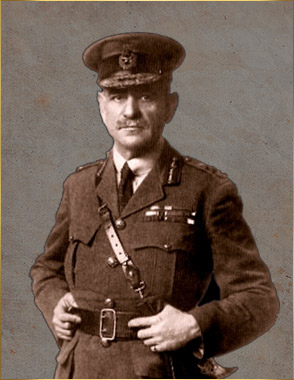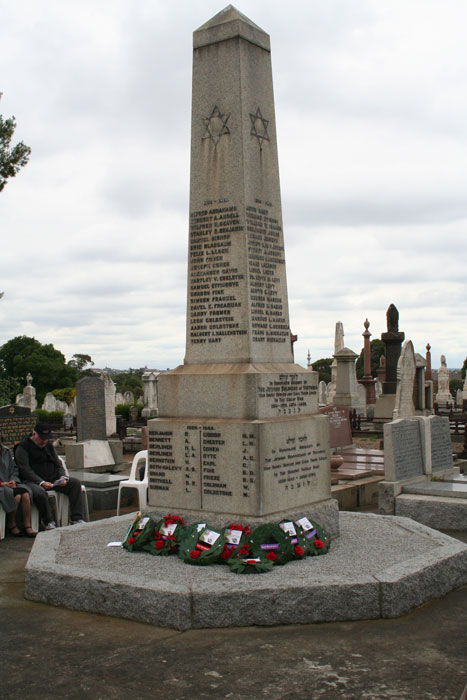Victorian Association of Jewish Ex & Servicemen & Women Australia Incorporated
Founding Member General Sir John Monash GCMG KCB VD
Cohen CMG CBE DSO VD
Surname
Cohen CMG CBE DSO VD
First names
Harold Edward The Hon
Rank
Brigadier
Service No.
WWI Lieutenant Colonel / WWII VX80699
Date of Death
29/10/1946
Hebrew Date
4 Cheshvan 5707
Hebrew Date
ד׳ בְּחֶשְׁוָן תש״ז
Age at Death
65
How Died
Where Died
Melbourne, Victoria, Australia
Cemetery
Melbourne General Cemetery, Victoria, Australia
Service Details
Deputy Adjutant General, Allied Land HQ
Served
Middle East, England and France
Occupation
Lawyer, politician and businessman
Age at Enlistment
60
Place of Enlistment
Caulfield, Victoria
Locality on Enlistment
WWI 'Worane', 110 Wattletree Road, Malvern, Victoria / WWII 25 Mercer Road, Armadale, Victoria
Religion
Jewish
Gender
Male
Date of Enlistment
WWI 21/8/1915 / WWII 20/7/1942
Date of Discharge
WWI 13/8/1919 / WWII 18/5/1944
Country of Enlistment
Australia
Notes
Born 25/11/1881 Melbourne, Victoria. Harold Edward Cohen was a soldier, lawyer, politician and businessman, was born on 25 November 1881 at St Kilda, Melbourne, only child of Montague Cohen and his wife Annie, née Cohen. He attended Xavier College, the first Jewish boy to do so. He completed the two-year articled clerks' course at the University of Melbourne in 1900, winning the Law and the Bowen Essay prizes. In 1904 he gained the Supreme Court Prize and was admitted to legal practice in the family firm of Pavey, Wilson & Cohen. He gradually assumed duties in his father's business empire. On 4 December 1907 at the St Kilda Town Hall he married Freda, daughter of Samuel Pirani, a solicitor; they had four children. In 1901 Cohen was commissioned in the Field Artillery Brigade, Australian Military Forces, and was promoted captain in 1905 and major in 1909. In 1915 he was appointed commanding officer of the 6th Army Brigade, Australian Field Artillery Regiment, Australian Imperial Force, with the rank of lieutenant-colonel, serving in the Middle East, England and France until June 1919. Twice wounded and twice mentioned in dispatches, he was awarded the Distinguished Service Order in 1917 and created CMG in 1918. After his return to Australia in September 1919, Cohen resumed practice in commercial and constitutional law, and became director of eight big companies in the brewing, paper and non-ferrous metals industries. He followed his father as president of the Liquor Trades' Defence Union and as chairman of directors of Swan Brewery Co Ltd and the Carlton group. In 1929 he entered parliament as member for Melbourne South Province in the Legislative Council, and was minister without office in 1932-35 in the Argyle-Allan ministry. In March 1935, as United Australia Party candidate, he won the seat of Caulfield in the Legislative Assembly, and from 20 March to 2 April was minister of public instruction and solicitor-general. He was narrowly defeated in the election of June 1943. Cohen continued his military involvement after 1919. In 1921-26 he commanded the 4th Divisional Artillery, AMF, and in 1926-27 the 2nd Infantry Brigade before transferring to the unattached list. In 1940-41 he went to the Middle East as honorary Red Cross commissioner. He became director of amenities, Land Headquarters, in July 1942 and was appointed adjutant-general in February 1943 with the rank of brigadier. Next year he was put on the reserve of officers with the rank of honorary brigadier. Cohen was chief commissioner of the Boy Scouts' Association in 1922-25 and was its president for twenty years. He was first president of the Legacy Club of Melbourne in 1924, and in 1926 was president of the Melbourne Constitutional Club, and of Melbourne Rotary. He was chairman of the Jewish Returned and Ex-Servicemen's Association in 1937-46. Cohen's rigorous Jesuit education and the tutelage of his father combined to produce a hard-working, thorough man, dedicated to duty as he saw it. His naturally romantic nature expressed itself in warm, informal, authoritarian leadership of fellow soldiers, co-workers and employees. While his frequent, highly articulate speeches in parliament revealed a distrust of 'socialist legislation', they combined legal knowledge with wide business experience. Military history was a hobby and he cultivated physical fitness. He represented Victoria at lacrosse, kept his horses in Malvern (he won the Caulfield Cup with Northwind in 1936) and played tennis and golf. The Harold and Freda Cohen prizes in education at the University of Melbourne were donated by him. He embodied many of the admirable qualities of the establishment Anglo-Jew, and made a contribution to his country which he considered with justification safeguarded and dignified the group from which he came. On 29 October 1946 in South Melbourne Cohen died of a brain tumour; he was survived by his wife, two sons and two daughters. He was accorded a military funeral and was buried in Melbourne general cemetery. Written by Barbara Falk.

 John Monash (Monasch) born
in Melbourne, Australia on 27 June 1865, the son of
German Polish Jewish migrants, can be researched in any
military history encyclopaedia or in fact by just
‘Googling’ his name on the internet. His history
and list of achievements are long and far too many to detail
in this brief summary. However, might I say that reading his
history is well worth the effort and I can assure you that
his deeds will amaze you. I have found that the deeds are
better labelled on more than one man and in more than one
lifetime.
John Monash (Monasch) born
in Melbourne, Australia on 27 June 1865, the son of
German Polish Jewish migrants, can be researched in any
military history encyclopaedia or in fact by just
‘Googling’ his name on the internet. His history
and list of achievements are long and far too many to detail
in this brief summary. However, might I say that reading his
history is well worth the effort and I can assure you that
his deeds will amaze you. I have found that the deeds are
better labelled on more than one man and in more than one
lifetime. An
announcement was made in the weeks leading up to the
Centenary of ANZAC by Judy Landau, President VAJEX Aust.
She stated that it gave her great delight to announce
that VAJEX Aust (Victorian Association of Jewish Ex
& Servicemen & Women Australia Inc) has
successfully raised the required funds to build a new
Victorian Jewish Memorial after the style of the
historic Memorial located in the Jewish section of the
Melbourne General Cemetery. After an extensive two year
process, Judy has single-handedly sought letters of
support, raised the funds, and obtained approval from
the City of Port Phillip.
An
announcement was made in the weeks leading up to the
Centenary of ANZAC by Judy Landau, President VAJEX Aust.
She stated that it gave her great delight to announce
that VAJEX Aust (Victorian Association of Jewish Ex
& Servicemen & Women Australia Inc) has
successfully raised the required funds to build a new
Victorian Jewish Memorial after the style of the
historic Memorial located in the Jewish section of the
Melbourne General Cemetery. After an extensive two year
process, Judy has single-handedly sought letters of
support, raised the funds, and obtained approval from
the City of Port Phillip.